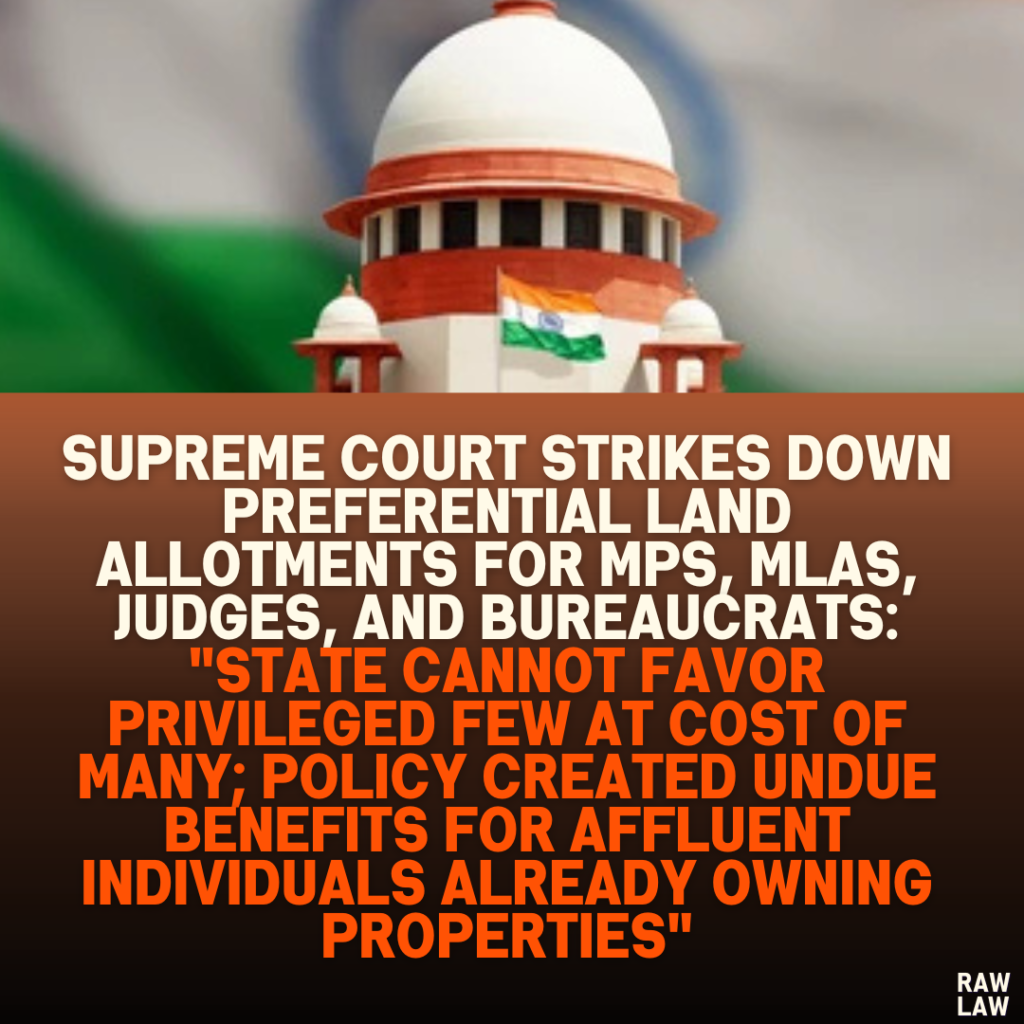Court’s Decision
The Supreme Court of India invalidated several Government Orders (G.O.Ms.), including Nos. 243 and 244, that facilitated the preferential allotment of government land to legislators, judges, journalists, and government officials at highly concessional rates. The Court held these orders to be unconstitutional as they violated the principle of equality under Article 14. The Court emphasized that state resources should be distributed equitably and transparently, without privileging a select group. It directed that the lands in question be restored to the government, with fresh allotments to be carried out through constitutionally compliant methods.
Facts
- Policy Overview:
- The Government of Andhra Pradesh issued G.O.Ms. Nos. 243 and 244 in 2005 to regulate land allocation.
- The policy allowed land allotments to Cooperative Societies comprising MLAs, MPs, All India Service (AIS) officers, judges, journalists, and weaker sections at concessional rates.
- Relaxation of Restrictions:
- Previous prohibitions on individuals who had already benefitted from concessional allotments or owned properties were lifted.
- The eligibility criteria were broadly defined, facilitating access for affluent individuals.
- Contention in Petitions:
- It was argued that the policy unfairly favored an elite group while depriving the general public, including weaker sections, of their rightful access to public resources.
- Petitioners claimed that such allotments were arbitrary, discriminatory, and not in public interest.
Issues
- Violation of Article 14: Does the policy, which selectively benefits specific privileged groups, violate the right to equality?
- Public Trust Doctrine: Can the state allocate public resources to individuals or groups without adhering to transparent and equitable processes?
- Applicability of Res Judicata: Should the principles of constructive res judicata bar the current challenge to G.O.Ms. 243 and 244?
- Economic Justice: Are such concessional allotments justifiable given the significant loss of public revenue and inequality in land distribution?
Petitioner’s Arguments
- Discrimination and Inequality:
- The policy created undue benefits for MLAs, MPs, judges, and bureaucrats, many of whom were already affluent and owned properties.
- Weaker sections and deserving groups were sidelined.
- Violation of Public Interest:
- Land is a public resource held in trust by the state and should be used to serve the broader public interest.
- Allocation at concessional rates resulted in a substantial loss of public funds.
- Economic Injustice:
- The petitioners highlighted that the market value of the allotted land was over ₹10,000 crores, but it was distributed at nominal rates.
- No Rational Basis:
- The preferential treatment lacked any rational nexus with public welfare and disproportionately benefitted the elite.
Respondent’s Arguments
- Separate Classification Justified:
- MLAs, MPs, judges, and AIS officers were argued to form a distinct class deserving of special treatment for their contributions to public service.
- Welfare Objective:
- The policy aimed to provide housing security to public servants, acknowledging their relatively lower pay scales and job-related sacrifices.
- Adherence to Market Value:
- Respondents claimed that the allotments were made at the “basic market value,” ensuring fairness.
- Safeguards Against Abuse:
- Measures such as affidavits, restrictions on resale, and eligibility checks were cited to prevent misuse of the allotted lands.
Analysis of the Law
- Violation of Article 14:
- The Court held that the policy violated equality by discriminating between the privileged elite and the general public.
- There was no compelling justification for treating affluent individuals as a distinct class.
- Public Trust Doctrine:
- As per the doctrine, the state is a trustee of public resources and must manage them for the benefit of all citizens.
- The Court found that the government failed in its duty by favoring a select few.
- Arbitrary Relaxation:
- Lifting restrictions on previous beneficiaries allowed individuals with existing properties to receive further benefits, which the Court deemed arbitrary and inequitable.
Precedent Analysis
- Forward Construction Co. v. Municipal Corporation (1986):
- Addressed the principles of constructive res judicata and found that matters that ought to have been raised earlier cannot be litigated again.
- All India Manufacturers Organisation v. State of Karnataka (2006):
- Emphasized that public resources must be allocated fairly and transparently, prioritizing public welfare.
- Natural Resources Allocation Cases:
- Reinforced that state largesse must adhere to constitutional principles and avoid arbitrary favoritism.
Court’s Reasoning
- Discriminatory Policy:
- The policy disproportionately benefitted affluent individuals while excluding genuine beneficiaries from weaker sections.
- Revenue Loss:
- Selling land at concessional rates caused significant losses to the state exchequer, depriving funds for public welfare programs.
- Public Trust Breach:
- The state acted contrary to its role as a trustee of public resources by favoring a privileged few.
- Res Judicata:
- The Court rejected the application of constructive res judicata, stating that the challenge to G.O.Ms. 243 and 244 was distinct and valid.
Conclusion
The Supreme Court declared the impugned G.O.Ms. unconstitutional, ordered the restoration of allotted lands to the government, and directed that fresh allotments be carried out only through transparent and equitable methods.
Implications
- Accountability in Resource Allocation:
- The judgment reaffirms that public resources must be distributed equitably and transparently, adhering to constitutional principles.
- Precedent for Future Policies:
- Governments must ensure that welfare schemes and resource allocation do not disproportionately benefit the privileged at the cost of the majority.
- Protection of Public Interest:
- The decision underscores the judiciary’s role in safeguarding public interest against arbitrary state actions.




Pingback: High Court of Jammu & Kashmir and Ladakh Grants Bail to Schizophrenic Woman Accused of Killing Her Child, Emphasizes Unsoundness of Mind as a Key Factor - Raw Law